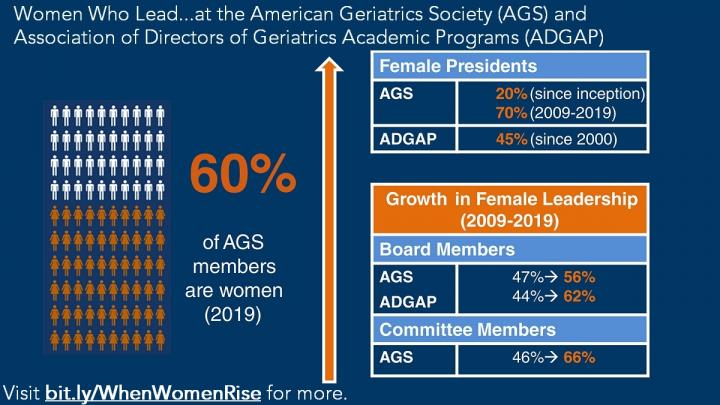
Credit: (C) 2019, American Geriatrics Society
Putting power and potential behind gender equity in health care isn’t just common sense. It’s critical to the future of health, safety, and independence for us all as we age, so says the American Geriatrics Society (AGS) in a new position statement released today, International Day of Older Persons. The statement outlines strategic objectives that can help us achieve a simple truth: “When women rise, we all rise.”
“Gender discrimination isn’t just ‘wrong.’ It has real and alarmingly negative public health consequences,” said Sunny Linnebur, PharmD, FCCP, FASCP, BCPS, BCGP, president of the AGS. “At a time when more of us than ever before are poised to contribute to our communities thanks to longer lifespans, we need the whole of society–irrespective of gender, race, religion, and sexual orientation–to stand against discrimination as we stand up for women. Because when women rise, we all rise.”
In the new position statement published in the Journal of the American Geriatrics Society (JAGS; DOI: 10.1111/jgs.16195), the AGS Women in Geriatrics Section and Public Policy Committee reviewed evidence, position statements from other organizations, and recommendations for addressing gender inequity from other professional groups. The workgroup recognized that the workforce caring for older people is diverse, encompassing direct care workers, family caregivers, nurses, pharmacists, physicians, physician assistants, social workers, and many other health professionals. The resulting statement focuses on four recommendations for ending gender discrimination across fields and practices:
- Address discriminatory practices: Discrimination based not just on gender but also on any number of personal characteristics stymies critical workforce growth and prevents diverse perspectives from improving our care. From establishing inclusive task forces for reviewing policies to encouraging individual practitioners to identify and “speak out…when you observe implicit or explicit gender bias,” the AGS position statement takes direct aim at biases that harm individuals and society as a whole.
- Address pay discrepancies: Across the U.S. workforce, women continue to earn 85 percent of the compensation provided to men in similar positions. Discrepancies in pay not only make it more challenging to make ends meet but also reinforce a culture that sees women frequently passed over for major assignments, leadership opportunities, senior mentoring, and promotions. The AGS position statement suggests a host of solutions, from systemic reviews of compensation and benefits to empowering both women and men to advocate for pay parity and build equity into hiring decisions.
- Address family and medical leave: The federal Family and Medical Leave Act (FMLA) entitles eligible employees to as many as 12 weeks of annual unpaid leave to recover from a serious illness or care for a newborn, newly adopted child, or seriously ill family member. However, roughly 40 percent of workers–including many health professions trainees in geriatrics–remain ineligible for FMLA coverage, and millions who are eligible still struggle to afford unpaid time off. The AGS position statement calls not only for making paid family and medical leave a priority but also for offering flexible arrangements that can help the whole of our workforce–particularly women, who still provide most of care in the U.S.–balance personal and professional priorities equitably.
- ADGAPAdvance women in leadership positions: In the past decade, women leaders have made significant strides aimed at shattering the “glass ceiling.” At the AGS alone, the percentage of female presidents increased to 70 percent between 2009 and 2019, with women now comprising 60 percent of the AGS membership overall. Still, women in the workforce continue to receive less leadership recognition than their male counterparts, in part because women often are passed over for management positions but also because a culture of discriminatory harassment and “micro-aggressions” (indirect statements or actions that reflect subtle or even unintentional bias against members of a marginalized group) can make leadership feel out-of-reach. The AGS position statement offers recommendations to help employers, health leaders, and men and women identify promising female candidates and ensure the whole of the workforce can continue to grow.
To make these priorities a reality, the AGS position statement also offers specific recommendations for groups critical to future progress. These include:
- Employers, who are key not only to ending existing bias and discrimination but also to putting better policies, processes, and programs in place to help women rise.
- Health leaders, who are critical in advocating for change and modeling best practices.
- Male colleagues, who also have a deeply vested interest in gender equity as a key factor contributing to health, education, and financial stability for us all.
- Women across the workforce, who must work together as allies, particularly as they make gender equity–and equity overall–the rule rather than the exception.
###
The full AGS position statement and list of recommendations is available for free from JAGS. For more information on ways you can support women in the workforce–particularly the women clinicians, educators, researchers, and advocates we need as we age–visit AmericanGeriatrics.org/Where-We-Stand or bit.ly/WhenWomenRise.
About the American Geriatrics Society
Founded in 1942, the American Geriatrics Society (AGS) is a nationwide, not-for-profit society of geriatrics healthcare professionals that has–for more than 75 years–worked to improve the health, independence, and quality of life of older people. Our nearly 6,000 members include geriatricians, geriatric nurses, social workers, family practitioners, physician assistants, pharmacists, and internists. The Society provides leadership to healthcare professionals, policymakers, and the public by implementing and advocating for programs in patient care, research, professional and public education, and public policy. For more information, visit AmericanGeriatrics.org.
Media Contact
Daniel E. Trucil
[email protected]
Original Source
https:/
Related Journal Article
http://dx.




